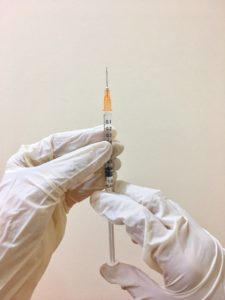PHILADELPHIA, PA – August 26, 2023 – With the onset of the COVID-19 pandemic, vaccination and medical science has been politicized and attacked by various individuals and groups. Critics have spread misinformation that the COVID-19 vaccine is dangerous and ineffective in spite of strong evidence to the contrary. COVID-19 public health mandates like masking, vaccination and lockdowns have met with strong resistance and backlash about the loss of individual freedoms. These finding are consistent with a decrease in the childhood vaccination rate since the COVID-19 pandemic, according to data from the CDC and the American Medical Association.
Vaccination has markedly reduced the spread and even eliminated many harmful communicable viral diseases. Polio, smallpox, and rabies have almost been eliminated while common childhood illnesses like measles, mumps, and rubella are very rare nowadays in America. The high rate of vaccination of children has contributed to ‘herd immunity’ where the whole community is protected because person-to-person spread becomes unlikely. Most public schools require all children to be vaccinated against many common contagious diseases unless there is a medical or a religious exemption. Up until the COVID pandemic, a very small percentage of students filed for these exemptions, preserving a high vaccination rate and population immunity to these diseases.
A study from the University of Pennsylvania was published in the journal Vaccine on August 26 about how Americans feel about getting routine vaccinations for their pet dogs. 22 hundred people were specifically chosen for a nationally representative survey. More than one-half of the people surveyed believe that dog vaccination is either unsafe, unnecessary or ineffective. The paper concluded that the recent COVID-19 pandemic has changed how Americans feel about vaccination in general. People who are skeptical about vaccination in humans are more likely to be hesitant about vaccinating their dogs. The authors opine that vaccines work so well that people no longer have any experience with the diseases that they protect against. One good example of a rare health problem in dogs and humans is rabies, a disease that is almost always fatal. Most dogs in America have been vaccinated against rabies, so there has not been much spread of this disease in dogs or to humans from dog bites. According to the CDC, only 60-70 dogs develop rabies annually in the U.S. There are only 1-3 human cases of rabies annually.
Dr. Peter Hotez, pediatrician, vaccine researcher, and Dean for the National School of Tropical Medicine at the Baylor College of Medicine, and whose appearances on many news networks during the COVID pandemic earned him the distinction of being one of the most trusted public health officials, has written a soon-to-be published book entitled “The Deadly Rise of Anti-Science.” He describes how the anti-vaccine movement has become a political tool that has been promoted by some elected officials and news media. According to Hotez, the anti-vaccine movement has joined forces with the anti-science movement resulting in a backlash against COVID-19 prevention, diagnosis and treatment. He reports that a lot of severe illness and many deaths from COVID could have been prevented by following the science.
Vaccine hesitancy has become a major political controversy. It has led to a lower vaccination rate in humans and a change in attitude toward vaccinating pet dogs. The solution to this anti-science attitude is through positive messaging. Good information will provide increased transparency about the few risks and overwhelming benefits of vaccination in order to restore American’s trust in science and the reduction of communicable disease through vaccines. Understanding why people are vaccine hesitant will enable an issue-focused approach to achieving vaccine buy-in.
Listen to the full report below:
Contact: Dick Needleman, Health reporter, 103.3 AshevilleFM, [email protected]
More Posts for Show: Asheville FM News Hour
